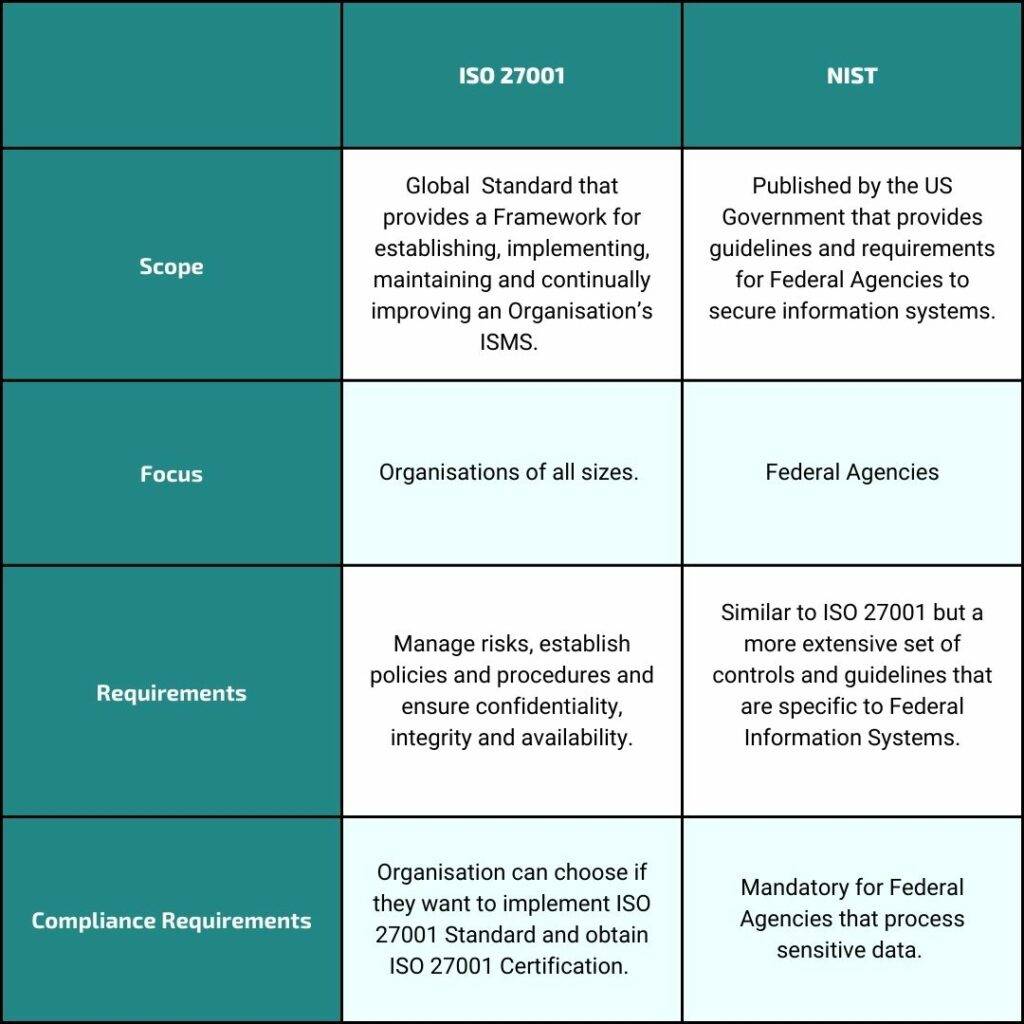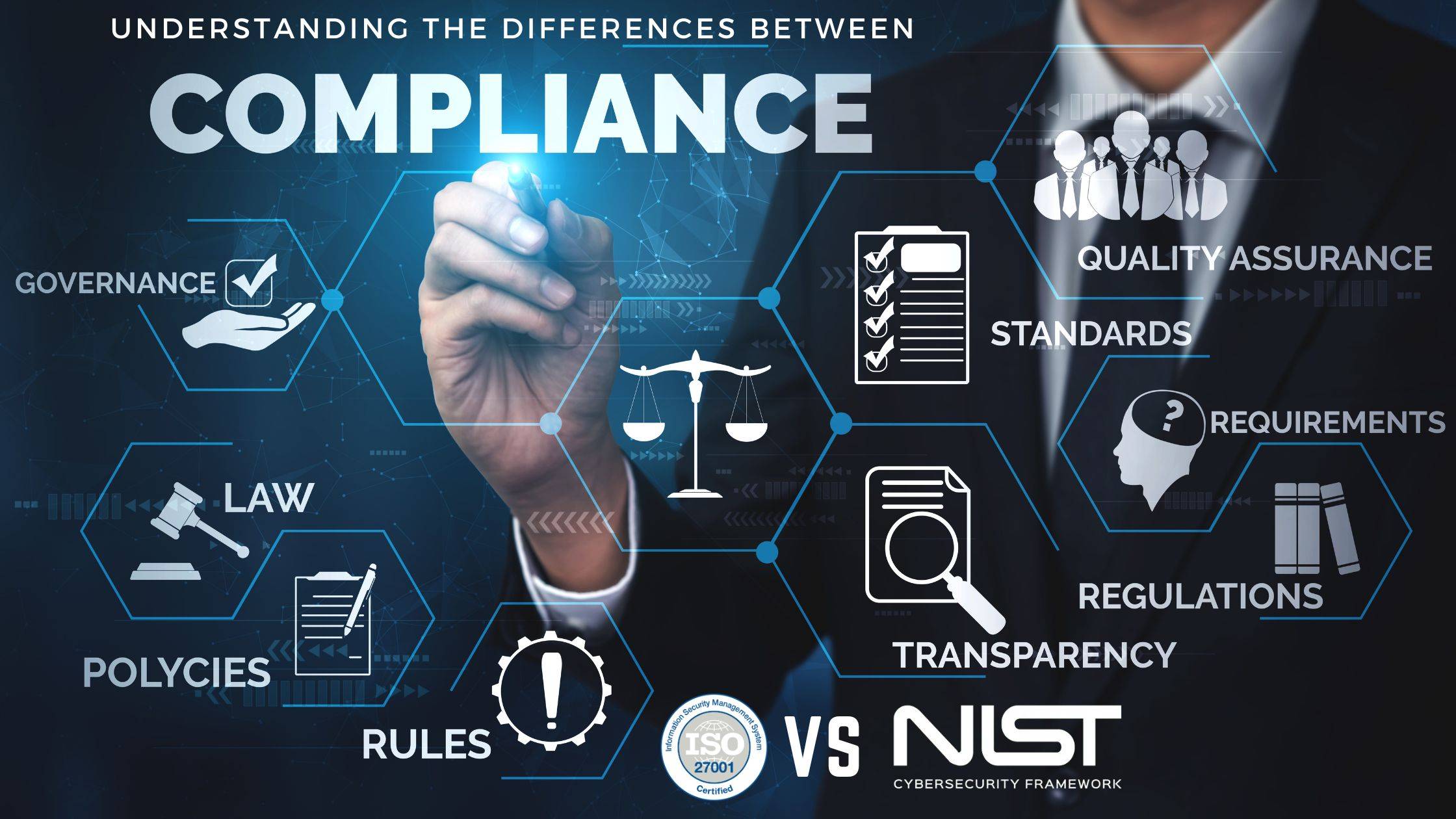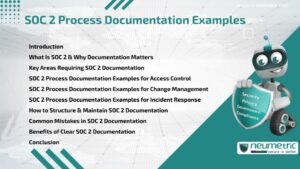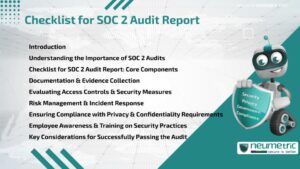Table of Contents
ToggleNIST Cybersecurity Framework vs ISO 27001
Introduction
The National Institute of Standards and Technology [NIST] Cybersecurity Framework provides a voluntary framework of guidelines, best practices, and standards for organisations to improve their Cybersecurity Risk Management. It helps organisations identify and assess cybersecurity risks and create a plan to manage and mitigate those risks.
ISO 27001 is an international Standard that specifies requirements for establishing, implementing, maintaining, and continuously improving an Information Security Management System [ISMS] within an Organisation. It provides a systematic approach to managing sensitive Company information and ensuring the confidentiality, integrity, and availability of that information.
Both NIST Cybersecurity Framework and ISO 27001 play a vital role in the Cybersecurity industry because they provide a comprehensive framework for organisations in mitigating their Cybersecurity risks. Compliance with these standards help organisations protect their sensitive data, establish trust with their customers and partners and avoid potential threats and data loss incidents. Additionally, Compliance with these Standards can be a requirement for doing business with certain clients or industries, such as Government Contracts or Financial Institutions.
NIST Cybersecurity Framework Vs ISO 27001
NIST Cybersecurity Framework
National Institute of Standards and Technology [NIST] has various guidelines meant to assist organisations in improving and upgrading their cybersecurity methodologies and practices.The framework of NIST is focused on providing best methods to the organisations for the protection of their sensitive information against cyber threats.
The NIST Risk Management Framework [RMF] includes various steps:
- To mitigate risks related to security and privacy.
- To differentiate the systems and variety of data collected,analysed and being transmitted.
- To make use of appropriate controls to safeguard the system based on risk assessments.
- Implementation of controls and documentation of their deployment.
- To check if the controls implemented provide the intended outcomes.
- To provide operational authority to experienced officials who make decisions depending on the risks.
- To keep a watch on risks and controls implemented in the system.
NIST Framework core Functions
The five (5) Functions included in the Framework Core are:
- Identify: It involves identification of risks and providing suitable solutions to mitigate the risks. It helps organisations minimise risks associated with their assets, sensitive information, consumer data, etc. and helps them to focus their efforts and set priorities that align with their Risk Management strategy and business needs.
- Protect: It involves safeguarding the data from cyber threats. It establishes appropriate protective measures to ensure the delivery of critical infrastructure services. It supports the ability to limit or contain the impact of a potential cybersecurity incident.
- Detect: It involves detection or identification of potential threats and defines the appropriate activities to detect the occurrence of a cybersecurity event. It enables the timely detection of cybersecurity events.
- Respond: It involves various methods of responding to the threats detected and include appropriate activities to respond to a detected cybersecurity incident. This function supports the ability to contain the impact of a potential cybersecurity incident.
- Recover: This step involves recovering the crucial data that was compromised during an incident. The Recovery function includes appropriate activities to maintain resiliency plans and restore capabilities or services that have been impacted by a cybersecurity incident. The Recover function supports the timely restoration of normal operations to reduce the impact of a cybersecurity incident.
Benefits of NIST
- It assists companies to achieve a global standard for cybersecurity.
- It helps in business growth.
- It involves various Risk Management activities.
- It improves communication between your company’s technical and financial leaders.
- The flexibility of the framework makes it easy to implement for any organisation.
ISO 27001
ISO 27001 is the international standard for Information Security which includes specification for an effective Information Security Management System [ISMS] and helps organisations manage their Information Security needs. Having an ISO 27001 Certificate means that an Organisation has its ISMS in line with Information Security best practices. ISO 27001 provides a framework for organisations to improve its ISMS. An ISMS takes a systematic approach to securing the Confidentiality, Integrity and Availability [CIA] of the corporate information assets. An ISMS consists of policies, procedures, plans, programs and other controls involving people, processes and technology. Having an ISMS is an efficient way to keep information assets secure.
List of ISO 27001 requirements
- Organisational: This group of requirements focuses on the organisation’s management system, policies, procedures, and internal controls for managing information security. It includes requirements such as defining the scope of the ISMS, assigning responsibilities for information security, and establishing a risk management framework.
- People: This group of requirements focuses on the human aspects of information security, including personnel security, training, awareness, and communication. It includes requirements such as conducting background checks on employees, providing information security training and awareness programs, and ensuring that employees understand their roles and responsibilities in relation to information security.
- Physical: This group of requirements focuses on the physical aspects of information security, including the protection of the organisation’s physical assets and the physical security of its facilities. It includes requirements such as controlling access to buildings and rooms, protecting against environmental threats, and ensuring the proper disposal of sensitive information.
- Technological: This group of requirements focuses on the technical aspects of information security, including the selection, implementation, and maintenance of information security controls. It includes requirements such as securing networks and information systems, controlling access to information and data, and implementing data backup and recovery procedures.
Each of these four groups of requirements is essential to the effective implementation of an ISMS, and they work together to provide a comprehensive approach to managing and protecting sensitive information.
Benefits of Certification
- Helps in Business growth
- To achieve Compliance and improve the Security posture
- To safeguard the Data.
- Show potential clients that you take security seriously; and set yourself apart from the competition.
- Avoid the financial penalties and losses associated with data breaches
- Protect and enhance your reputation
- Meet business, legal, contractual, and regulatory requirements
- Reduce the need for frequent audits
Differences Between NIST Cybersecurity Framework and ISO 27001

Similarities:
NIST and ISO 27001 aim to strengthen an organisation’s security posture and improve its incident preparedness. The Risk Management Framework of ISO 27001 and NIST Cybersecurity Framework are similar too. Their key similarities of their Risk Management are:
- It helps organisation to identify risks
- It helps to mitigate the risks and implement controls
- They help in monitoring the controls and plans for long term goals
Differences:
- NIST is designed for organisations that work with Federal Agencies while ISO 27001 is for organisations of all sizes or locations.
- NIST has a catalogue for a variety of controls while ISO 27001 includes 93 controls that are divided into 4 groups.
- NIST Cybersecurity Framework consists of following components i.e The core, implementation tiers and Profiles while ISO 27001 has clauses/groups and controls which contains globally acceptable best practices.
- NIST does not require Audits and Certification while ISO 27001 requires Audits and Certification.
- NIST doesn’t charge for its services while ISO 27001 involves the Certification cost.
Choosing the Right Standard
The NIST Cybersecurity Framework and ISO 27001 both aim to improve an organisation’s cybersecurity but through different paths.
Generally, ISO 27001 is sought after by many organisations with a certain level of operational maturity and those that have reached a phase where their Clients ask for an ISO 27001 Certification to showcase their ISMS standards. On the other hand, NIST Cybersecurity Framework is one that even small organisations who want to begin their journey towards implementing security best practices can take up.
The significant overlap in controls and policies with ISO 27001 and other global frameworks makes it a catch, especially for organisations with tight InfoSec and Compliance budgets. In terms of cost and time commitment, both standards require a significant investment of resources to implement and maintain. The cost of implementing NIST Cybersecurity Framework or ISO 27001 will depend on the size of the organisation, the complexity of its IT infrastructure, and the level of expertise available in-house.
Generally, ISO 27001 is considered more costly and time-consuming to implement, but it also offers a more comprehensive and rigorous approach to Information Security Management. Ultimately, the choice between NIST Cybersecurity Framework vs ISO 27001 will depend on the organisation’s specific needs, resources, and goals.
Conclusion
NIST Cybersecurity Framework and ISO 27001 provides a framework for securing data from potential threats. The NIST Cybersecurity Framework is used by US Federal Agencies while the requirements of ISO 27001 can be implemented by any organisations that seek best practices in data protection.
NIST Cybersecurity Framework and ISO 27001 play a vital role in the cybersecurity industry because they provide a comprehensive framework for organisations in mitigating their cybersecurity risks. Compliance with these standards help organisations protect their sensitive data and establish trust of their customers and partners, and avoid potential threats and data loss incidents.
NIST does not require an Audit and Certification while ISO 27001 requires Audits and Certification. The cost of implementing NIST Cybersecurity Framework or ISO 27001 will depend on the size of the organisation, the complexity of its IT infrastructure, and the level of expertise available in-house. ISO 27001 is considered more costly and time-consuming to implement, but it also offers a more comprehensive and rigorous approach to Information Security Management.
The choice between NIST Cybersecurity Framework vs ISO 27001 will depend on the organisation’s specific needs, resources, and goals.
FAQs
Is NIST equivalent to ISO 27001?
No, the National Institute of Standards and Technology [NIST] Standard is not equivalent to ISO 27001. They are two separate standards used for Information Security Management.
What is the difference between NIST and ISO 27001?
The main difference between NIST vs ISO 27001 is that NIST is a set of guidelines created by the US government, while ISO 27001 is an international standard developed by the International Organization for Standardization [ISO].
Is ISO better than NIST?
It is not accurate to say that one is better than the other as they have different purposes and target audiences. NIST is primarily used by US federal agencies, while ISO 27001 is used by organisations worldwide.
What is the difference between ISO 27001 and NIST 800 171?
The main difference between ISO 27001 and NIST 800-171 is that NIST 800-171 is a specific subset of guidelines within the larger NIST framework that is focused on protecting Controlled Unclassified Information [CUI] in non-federal systems. ISO 27001 is a broader International Standard for Information Security Management.





